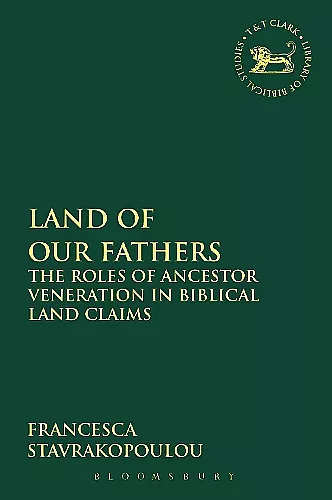Land of Our Fathers
The Roles of Ancestor Veneration in Biblical Land Claims
Francesca Stavrakopoulou author
Format:Paperback
Publisher:Bloomsbury Publishing PLC
Published:26th Jul '12
Currently unavailable, and unfortunately no date known when it will be back

Ancestor veneration plays important- and hitherto overlooked- socio-religious and ideological roles in various and competing territorial claims as presented in the Hebrew Bible.
The biblical motif of a land divinely-promised and given to Abraham and his descendants is argued to be an ideological reflex of post-monarchic, territorial disputes between competing socio-religious groups. The important biblical motif of a Promised Land is founded upon the ancient Near Eastern concept of ancestral land: hereditary space upon which families lived, worked, died and were buried. An essential element of concept of ancestral land was the belief in the post-mortem existence of the ancestors, who were venerated with grave offerings, mortuary feasts, bone rituals and standing stones.
The Hebrew Bible is littered with stories concerning these practices and beliefs, yet the specific correlation of ancestor veneration and certain biblical land claims has gone unrecognized. The book remedies this in presenting evidence for the vital and persistent impact of ancestor veneration upon land claims. It proposes that ancestor veneration, which formed a common ground in the experiences of various socio-religious groups in ancient Israel, became in the Hebrew Bible an ideological battlefield upon which claims to the land were won and lost.
Land of Our Fathers thoughtfully and creatively explores the ways in which fundamental connections between the ancestors and the land mapped culture in ancient Israel. Francesca Stavrakopoulou's work is interdisciplinary and methodologically sophisticated, drawing upon cultural anthropology and other fields to study "the territorialism of the dead." The author's analysis not only points to pan-Israelite patterns of culture but also to variations and developments in attitudes to the dead that reflect and respond to social, political, and historical dynamics. I look forward to sharing this important case study in the history of religion with my students in courses that deal with ancient Israelite and comparative religions. -- Susan Niditch, Samuel Green Professor of Religion, Amherst College
Against the background of wide reading in the anthropological literature on mortuary cults and the veneration of ancestors, Francesca Stavrokopoulou has now pioneered a new approach to conflicting land claims, territoriality, and the formation of group identity in ancient Israel. No one interested in these issues, by no means of purely historical interest, should miss out on this book. -- Joseph Blenkinsopp, John A. O'Brien Professor Emeritus of Biblical Studies University of Notre Dame
Because a dominant strain of thought in the Hebrew Bible is hostile to dealings with the dead, modern biblical scholarship has often concluded that this was the majority view in ancient Israel. Francesca Stavrakopoulou shows in this fascinating study that the dead were often seen as powerful, especially in helping people to establish a claim to land. Abraham, Moses, and many other figures legitimate land claims by their burial in salient places. This book challenges received opinions about the role of the dead in Israel and establishes a new model for thinking about burial customs. -- John Barton, Oriel & Laing Professor of the Interpretation of Holy Scripture, University of Oxford
[Stavrakopoulou] presents a detailed and thought-provoking exposition of key ancestral land claims in the Hebrew Bible, one that biblical scholars- especially those who focus on the religions of ancient Israel and Judah- will find fascinating and useful for further research... Scholars of other disciplines within religious studies, too, will benefit from her discussion of anthropological theory regarding burials and socio-cultural "landscapes" outlined in the first chapter and referenced throughout the work. This interesting and well-written volume, therefore, is highly recommended. * Studies in Religion / Sciences Religieuses *
ISBN: 9780567411884
Dimensions: unknown
Weight: 299g
208 pages